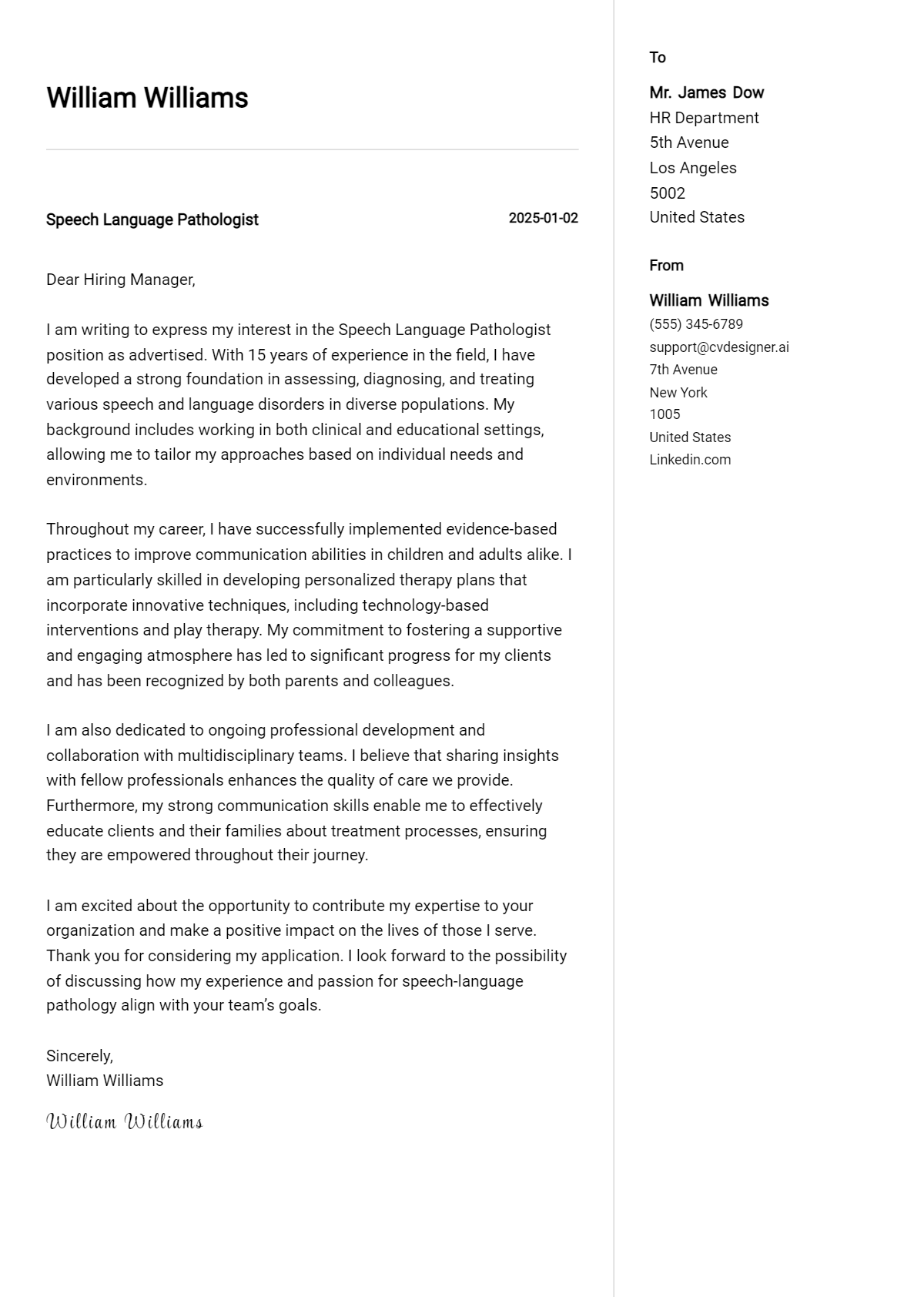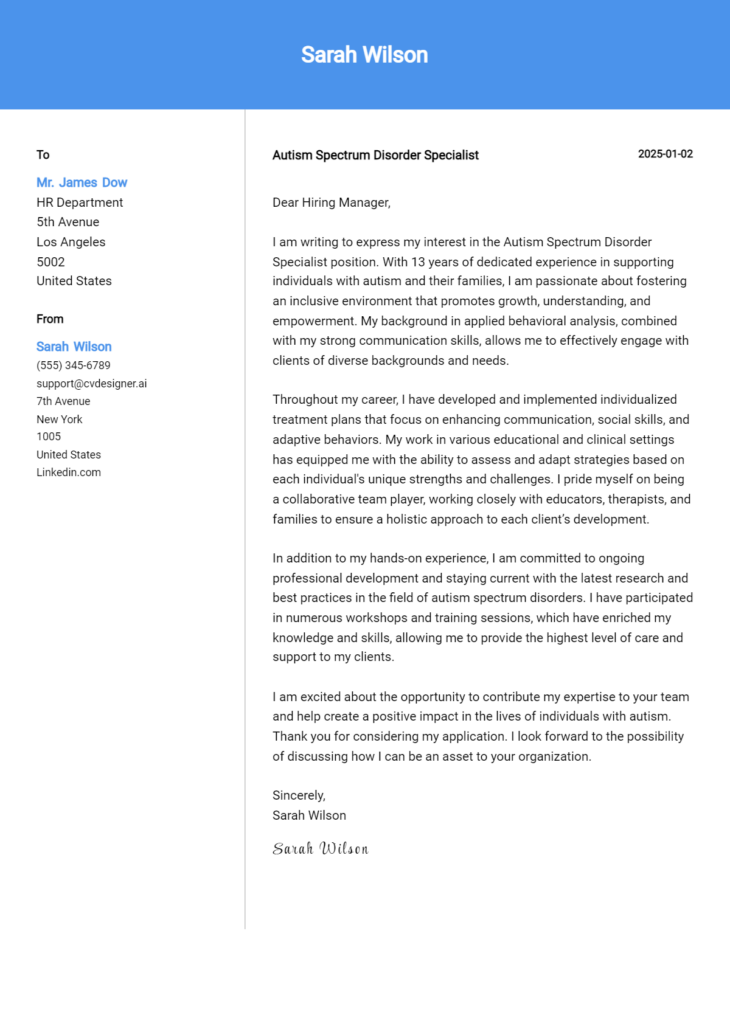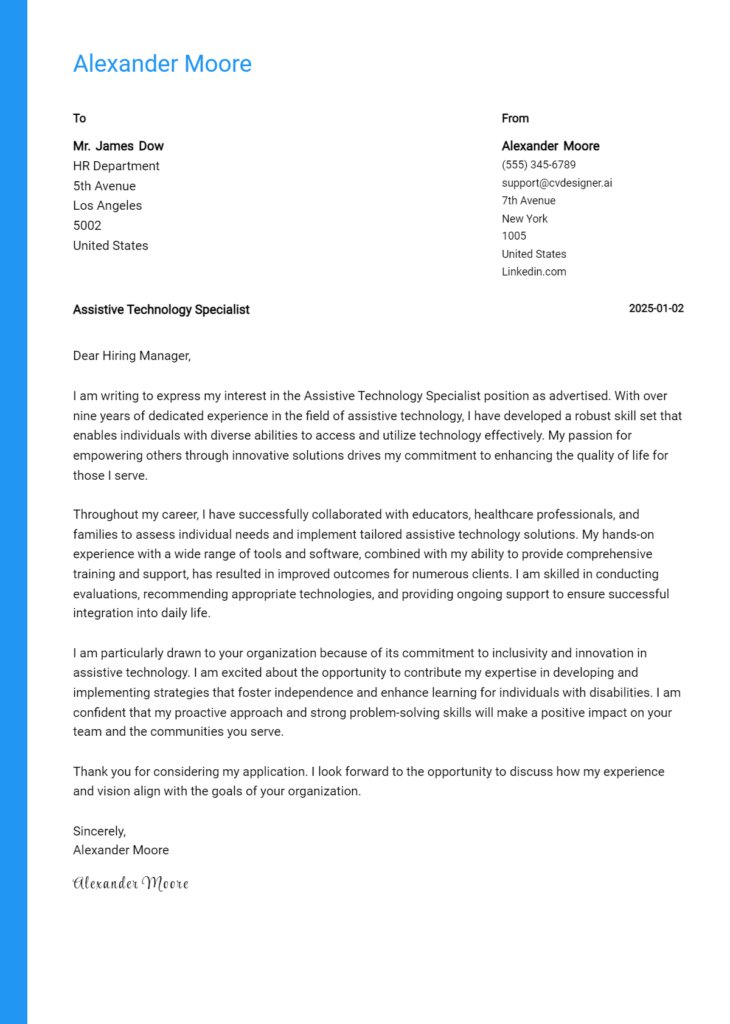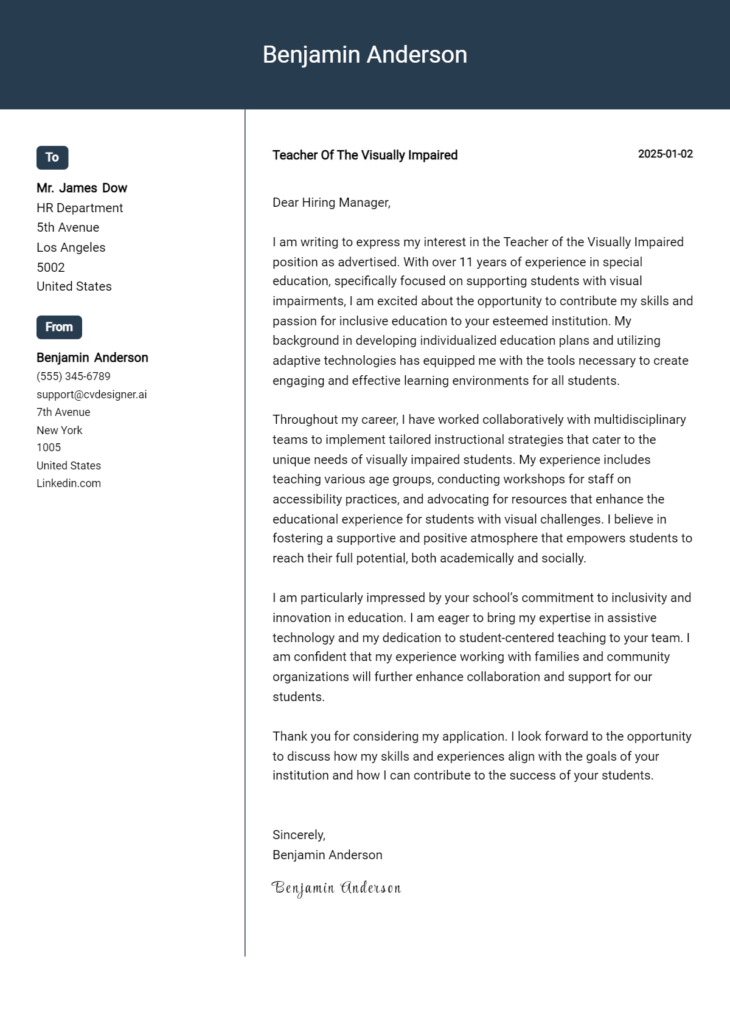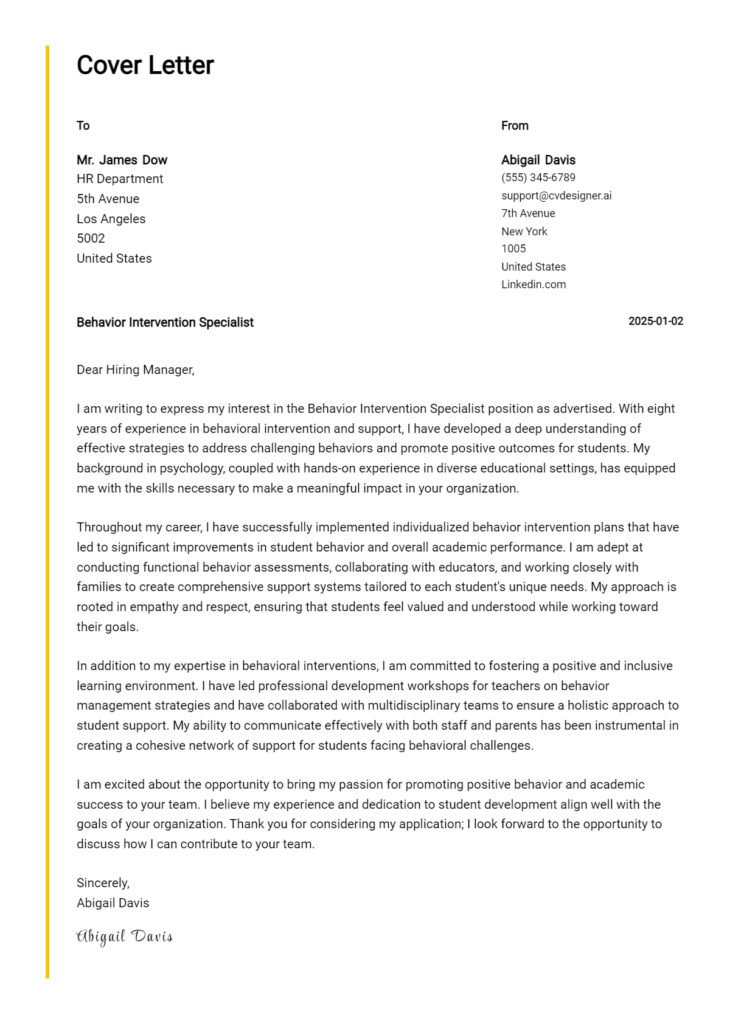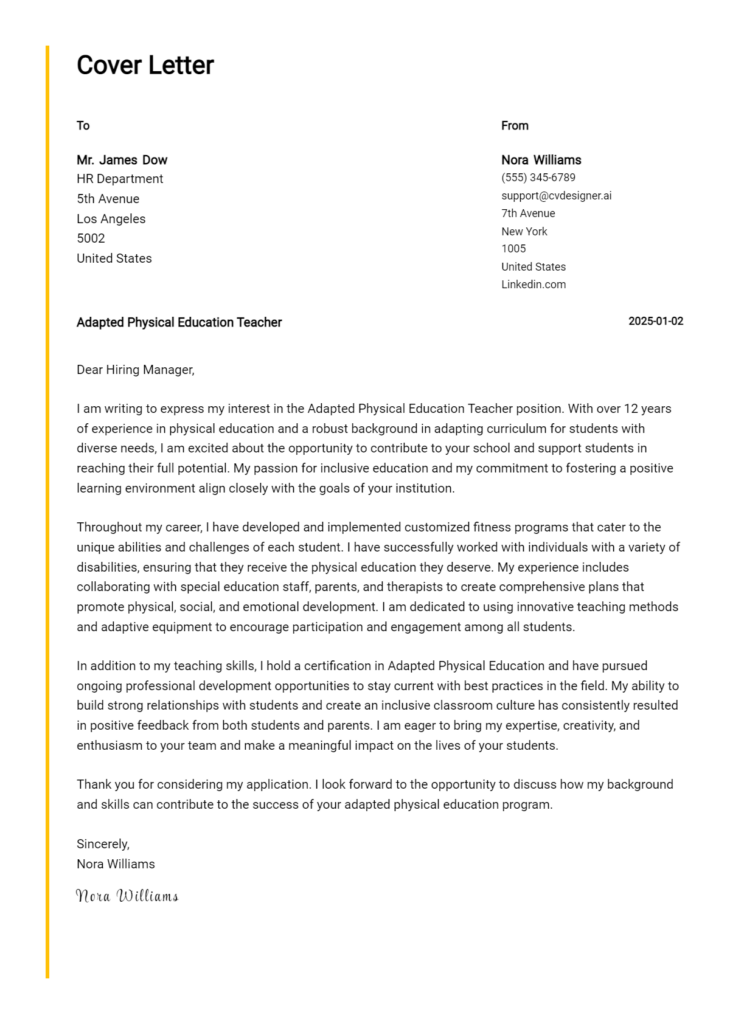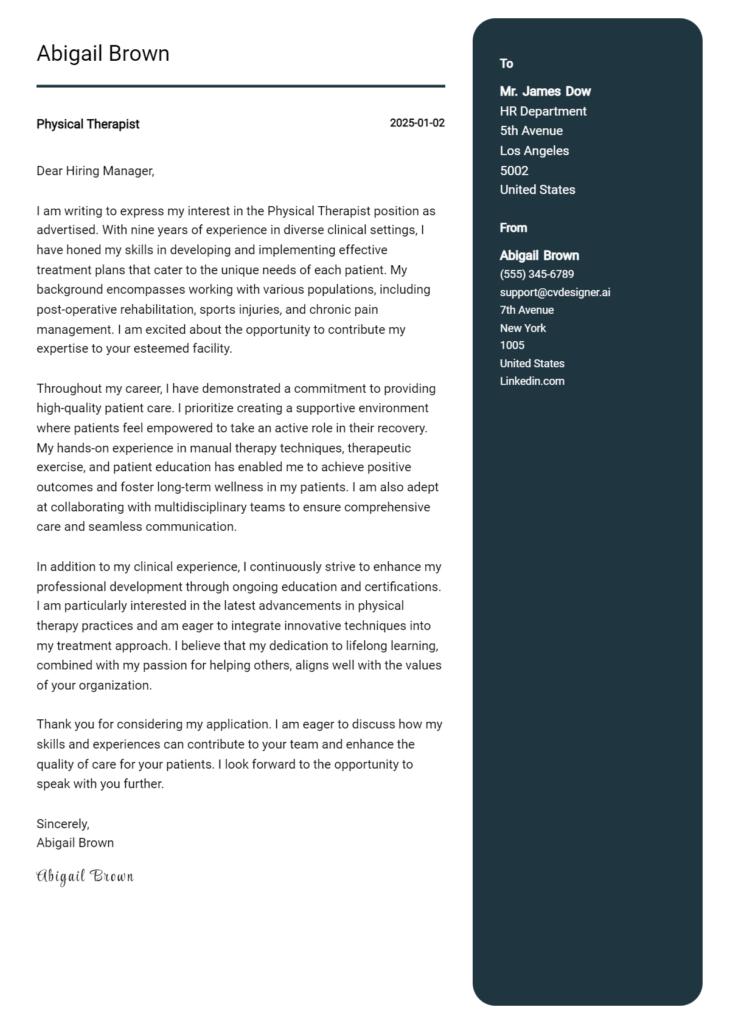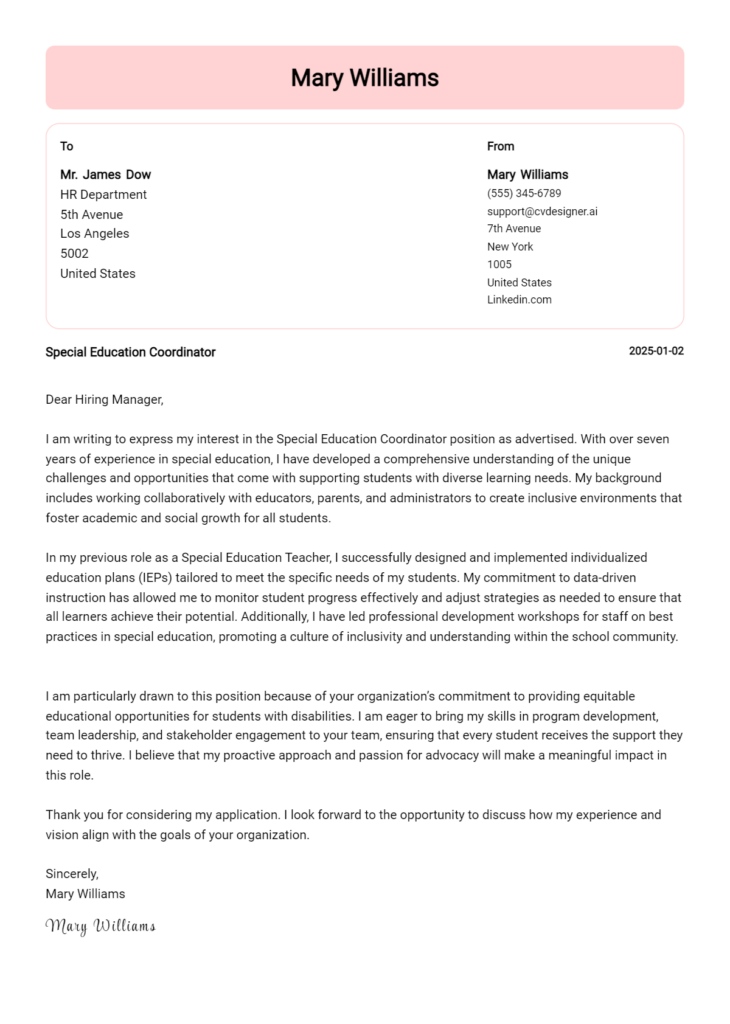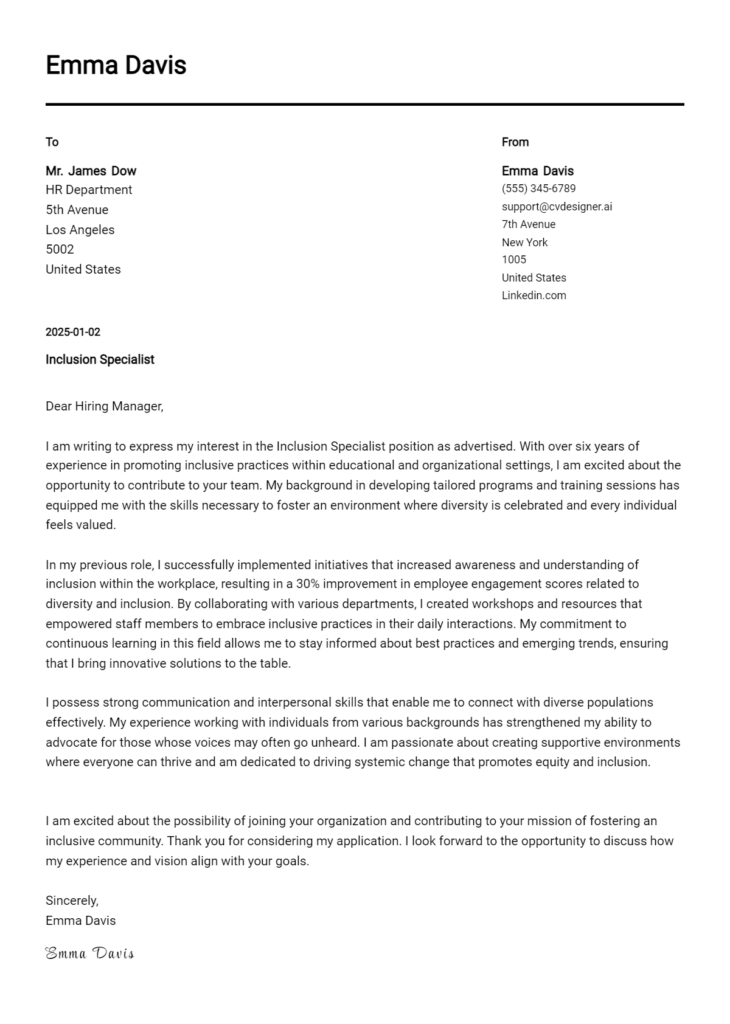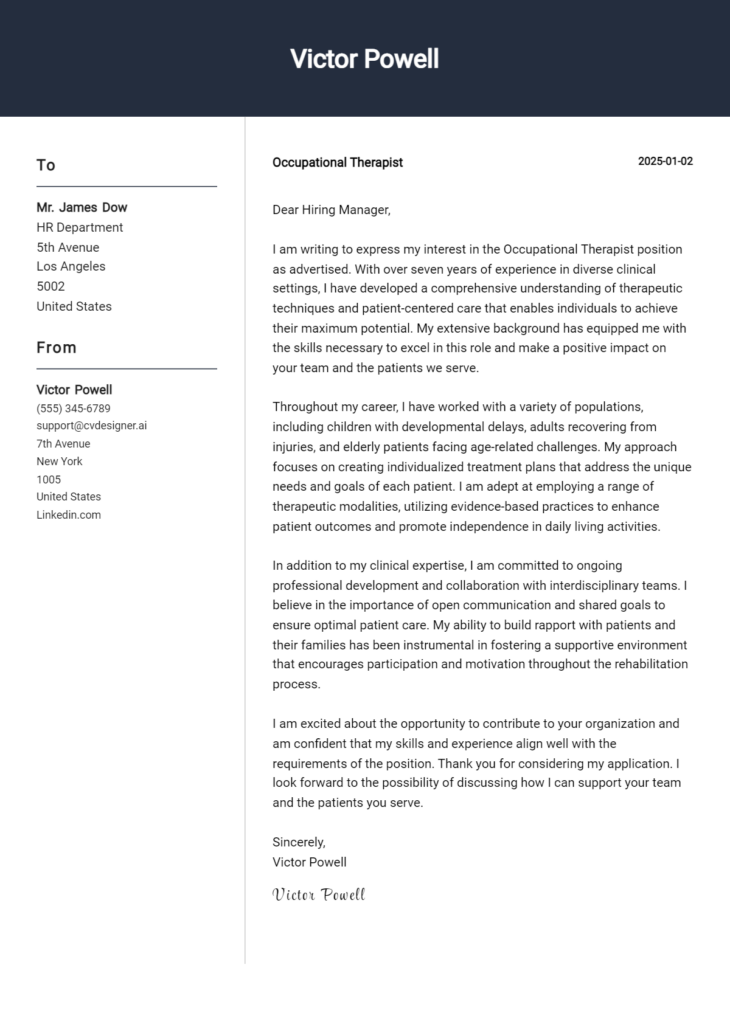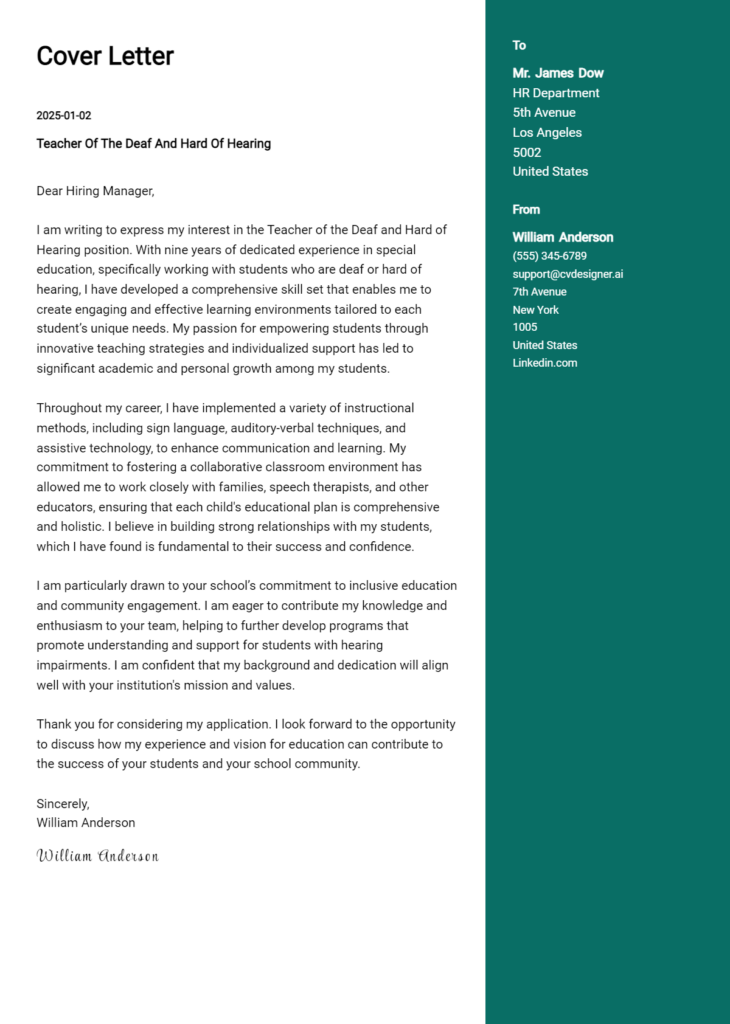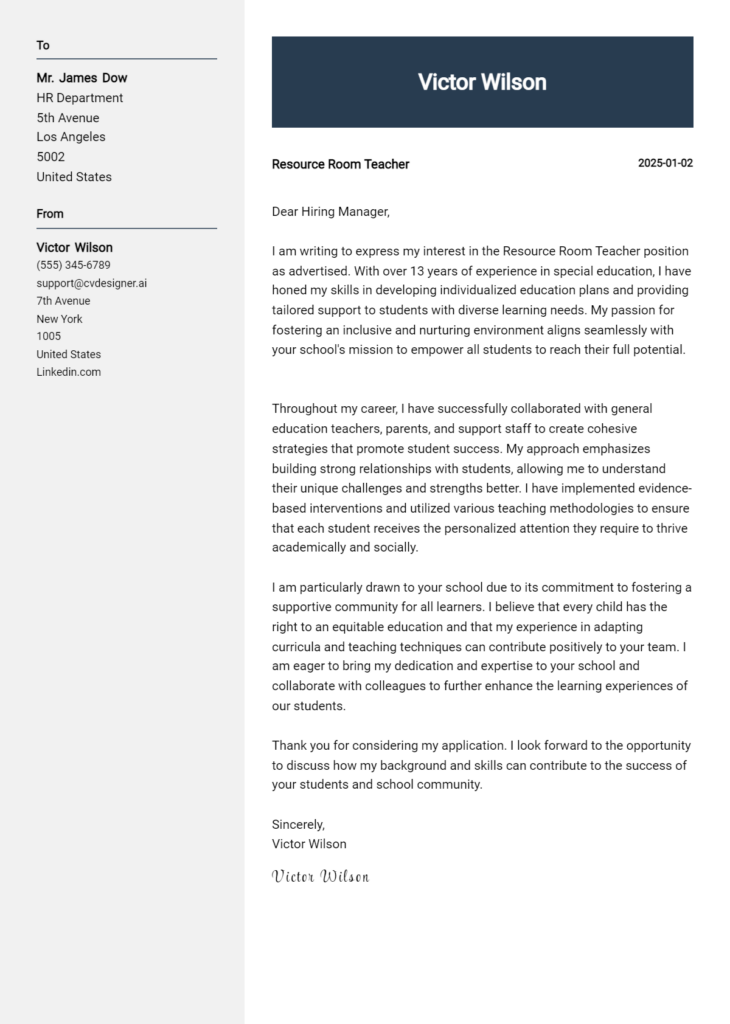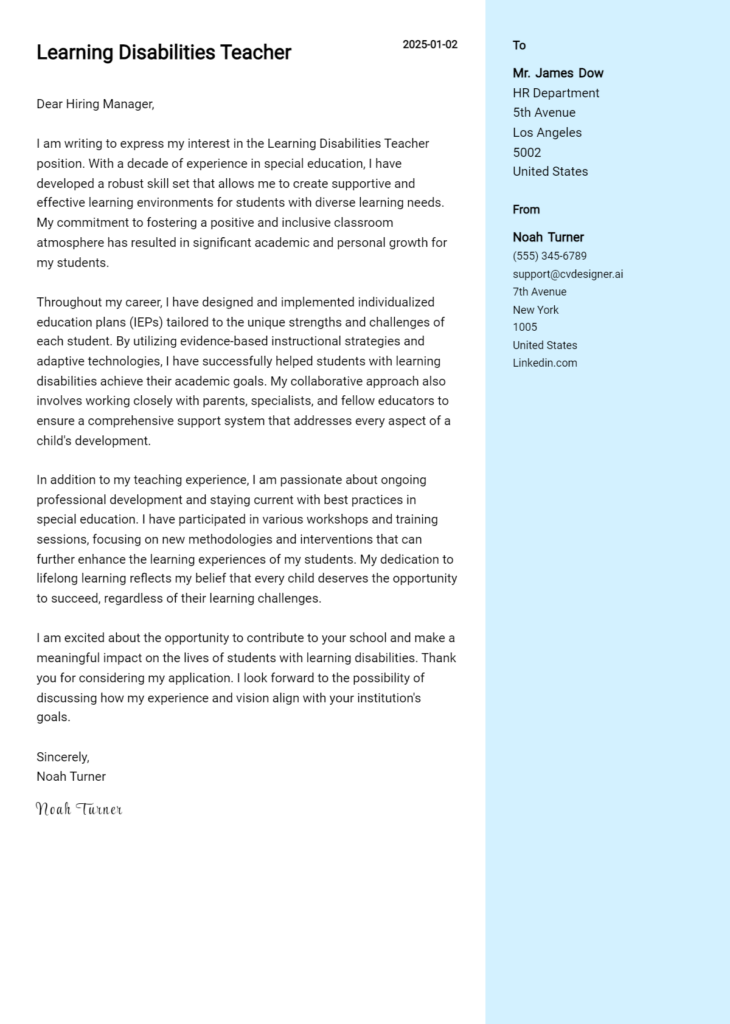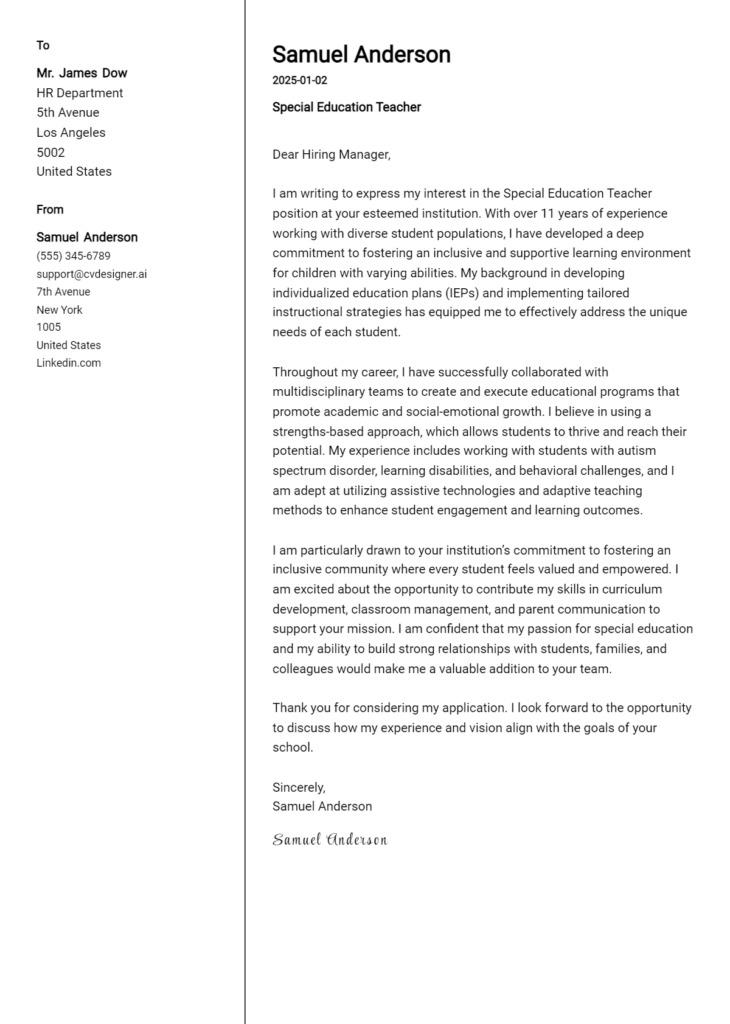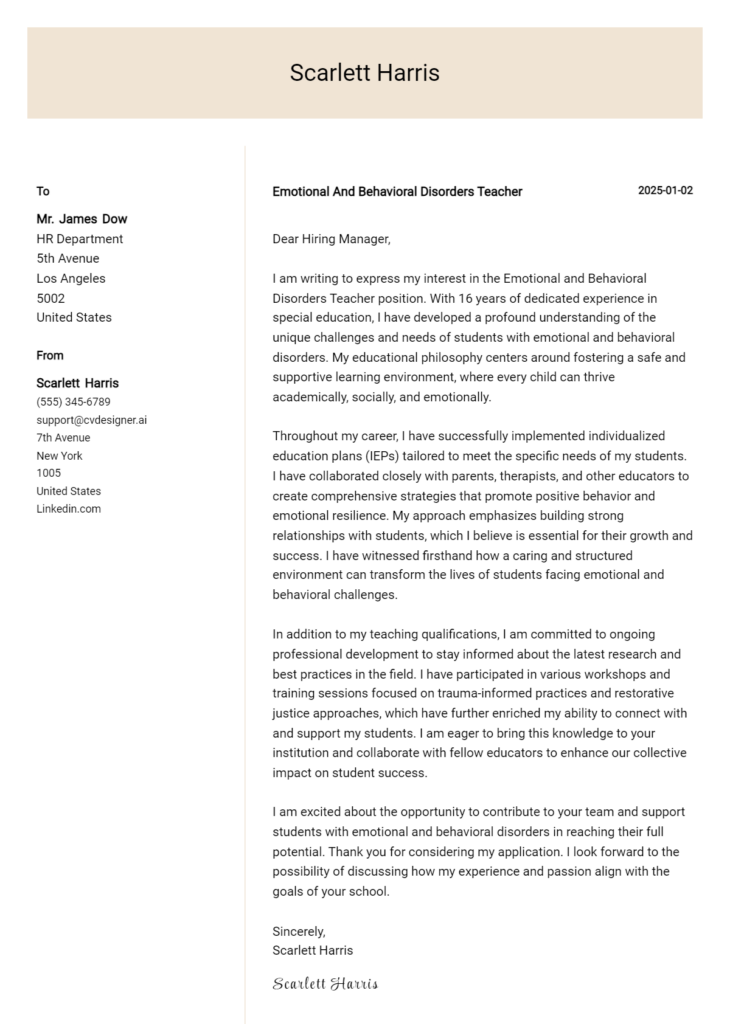Speech Language Pathologist Cover Letter Examples
Explore additional Speech Language Pathologist cover letter samples and guides and see what works for your level of experience or role.
How to Format a Speech-Language Pathologist Cover Letter?
Crafting a compelling cover letter is an essential step for Speech-Language Pathologists seeking to make a positive impression on potential employers. The formatting of your cover letter serves not only to present your qualifications but also to demonstrate your communication skills and attention to detail—two critical attributes in this field. A well-structured cover letter can effectively capture the hiring manager's interest, allowing you to showcase your dedication to helping individuals improve their speech and language abilities.
In this guide, we will outline how to structure your cover letter, providing valuable insights and examples tailored specifically for Speech-Language Pathologists.
We will focus on the essential components of a professional cover letter, including:
- Cover Letter Header
- Cover Letter Greeting
- Cover Letter Introduction
- Cover Letter Body
- Cover Letter Closing
Each section is crucial in highlighting your qualifications and professionalism. Let’s delve into each part and explore how to make your Speech-Language Pathologist cover letter truly stand out.
Importance of the Cover Letter Header for a Speech-Language Pathologist
The cover letter header is a crucial element of your application as a Speech-Language Pathologist. It serves not only as a professional introduction but also as a way to ensure clarity and organization for the reader. A well-structured header should include your contact information, the date, and the recipient's details (such as the hiring manager's name and the organization's information). This information establishes your identity and helps the employer easily reach you. Clarity and professionalism in your header can create a positive first impression, showcasing your attention to detail and commitment to the role.
Strong Example
Jane Smith, M.S., CCC-SLP 123 Therapy Lane Speechville, ST 12345 (123) 456-7890 jane.smith@email.com October 1, 2023 Mr. John Doe Hiring Manager Speech Therapy Center 456 Health Blvd Care City, ST 67890
Weak Example
Jane 123 Lane City, ST 10/1/23 To Whom It May Concern,
The Importance of a Strong Cover Letter Greeting
The greeting of your cover letter serves as the first impression for potential employers and sets the tone for the entire letter. A well-crafted greeting demonstrates professionalism and shows that you have taken the time to personalize your application by addressing the hiring manager directly. Avoiding generic greetings, such as "To Whom It May Concern," can make your cover letter stand out. Researching the recipient's name through the company's website or LinkedIn can help you establish a connection and show your genuine interest in the position. A personalized greeting not only engages the reader but also reflects your commitment to the role of a Speech-Language Pathologist.
Strong Greeting Example
Dear Dr. Smith,
Weak Greeting Example
To Whom It May Concern,
Cover Letter Introduction for Speech-Language Pathologist
A well-crafted cover letter introduction is crucial for a Speech-Language Pathologist as it serves as the first impression to the hiring manager. This section should not only capture attention but also convey genuine interest in the role while highlighting key skills or achievements relevant to the position. A strong introduction can set the tone for the rest of the letter, making it clear why the candidate is a perfect fit for the job. Conversely, a weak introduction can fail to engage the reader, potentially leading to the candidate being overlooked. Below are examples of both strong and weak introductions to illustrate the importance of this initial section.
Strong Example
Dear [Hiring Manager's Name], As a dedicated and compassionate Speech-Language Pathologist with over five years of experience in diverse clinical settings, I am eager to bring my expertise in speech and language disorders to [Company Name]. My commitment to improving communication skills in children and adults alike is matched only by my enthusiasm for collaborating with interdisciplinary teams to create tailored therapy plans. I am particularly proud of my work at [Previous Employer], where I successfully implemented a new program that improved patient outcomes by 30% within one year.
Weak Example
To whom it may concern, I am writing to apply for the Speech-Language Pathologist position at your organization. I have some experience in this field, and I think I might be a good fit. I have worked with various patients and have helped them with their speech issues, but I don’t have any specific achievements to mention.
Cover Letter Body for Speech-Language Pathologist
The body of a cover letter for a Speech-Language Pathologist is crucial as it provides an opportunity for the candidate to demonstrate their relevant skills and experiences while articulating their value to the prospective employer. This section should highlight specific projects or accomplishments that exemplify the applicant's expertise in diagnosing and treating speech, language, and communication disorders. By detailing successful interventions, collaborative efforts with multidisciplinary teams, or innovative therapy techniques, the candidate can effectively convey their passion for the field and their commitment to improving patient outcomes. A strong cover letter body not only showcases the candidate's qualifications but also aligns their experiences with the goals of the organization to which they are applying.
Strong Example
I am excited to apply for the Speech-Language Pathologist position at ABC Clinic, where I believe my extensive experience and dedication to patient care will make a significant impact. During my previous role at XYZ Rehabilitation Center, I successfully developed and implemented a new communication therapy program for children with speech delays, which resulted in a 30% improvement in their language skills within six months. Additionally, I collaborated closely with occupational therapists and educators to create individualized treatment plans that addressed each child's unique needs, demonstrating my commitment to a multidisciplinary approach. I am eager to bring my innovative strategies and compassionate care to the team at ABC Clinic, where I can contribute to enhancing the lives of our clients.
Weak Example
I think I would be a good fit for the Speech-Language Pathologist role because I have experience working with patients. In my last job, I helped some kids with their speech problems. I have taken some courses and learned a little about speech therapy. I am willing to learn more and improve my skills. I hope to work at your clinic and help patients.
Importance of the Cover Letter Closing for a Speech-Language Pathologist
The closing paragraph of a cover letter for a Speech-Language Pathologist is crucial as it leaves a lasting impression on the hiring manager. A strong closing effectively summarizes your qualifications, reiterates your enthusiasm for the position, and encourages the employer to take the next steps, such as reviewing your resume or scheduling an interview. In contrast, a weak closing may fail to convey your enthusiasm or provide a clear call to action, which can diminish your chances of progressing in the hiring process.
Strong Example
Thank you for considering my application for the Speech-Language Pathologist position at [Company Name]. With my extensive experience in pediatric speech therapy and my passion for helping children communicate effectively, I am confident in my ability to contribute positively to your team. I am eager to discuss how I can support your objectives and enhance the lives of the clients you serve. I look forward to the opportunity to further discuss my qualifications and explore how I can be a valuable asset to your organization. Please feel free to contact me to schedule an interview at your convenience.
Weak Example
I hope you read my resume. I think I would be a good fit for the job. Let me know if you want to talk.
These tips will help candidates craft an effective cover letter for a Speech-Language Pathologist position by emphasizing the need to showcase technical skills, problem-solving abilities, knowledge of the Speech Development Lifecycle (SDLC), teamwork, and a passion for continuous learning. A well-written cover letter can set you apart from other candidates, demonstrating not only your qualifications but also your commitment to the field.
Cover Letter Writing Tips for Speech-Language Pathologists
Highlight Your Technical Skills
Clearly outline your technical skills in speech-language pathology, including assessment tools, treatment techniques, and any specialized software you are proficient in. Be specific about how these skills have been applied in previous roles to enhance patient outcomes. This will demonstrate your capability and readiness for the position.Showcase Problem-Solving Abilities
Employers value candidates who can think critically and solve problems effectively. Provide examples of challenges you faced in past roles and how you approached them. Describe the strategies you implemented and the results achieved, showing your ability to adapt and overcome obstacles in patient care.Demonstrate Knowledge of the SDLC
If applicable, mention your understanding of the Speech Development Lifecycle (SDLC) and how it informs your practice. Discuss how this knowledge has shaped your approach to assessment and intervention, and how it ensures you deliver evidence-based care that meets the individual needs of your clients.Emphasize Teamwork and Collaboration
Speech-language pathology often involves working as part of a multidisciplinary team. Highlight your experience collaborating with other healthcare professionals, educators, and families. Provide specific examples of how your teamwork has led to improved patient outcomes, showcasing your ability to communicate and coordinate effectively.Express a Passion for Continuous Learning
The field of speech-language pathology is constantly evolving. Share your commitment to professional development, such as attending workshops, pursuing additional certifications, or staying updated with current research. This demonstrates your proactive approach to learning and growth, which is essential in providing high-quality care.
For further assistance in crafting your cover letter, consider using our cover letter templates or our cover letter builder. These resources can help you create a polished and professional presentation of your qualifications.
Common Mistakes to Avoid in a Speech-Language Pathologist Cover Letter
Crafting a well-written cover letter is crucial for standing out in the competitive field of speech-language pathology. Avoiding common mistakes can significantly enhance your chances of making a positive impression. Here are some typical pitfalls to watch out for:
- Generic Content: Failing to customize your letter for each job application can be detrimental. Always tailor your cover letter to reflect the specific requirements of the position.
- Spelling and Grammar Errors: Typos can undermine your professionalism. Always proofread your letter or use tools like Grammarly to catch mistakes.
- Lack of Specific Examples: Vague statements about your experience may not resonate with hiring managers. Use clear examples of your accomplishments, such as specific therapy techniques you’ve successfully implemented.
- Ignoring the Job Description: Not addressing key skills or qualifications mentioned in the job posting can be a missed opportunity. Make sure to reference them directly in your letter.
- Overly Formal Language: While professionalism is important, an overly formal tone can make your letter sound stiff. Aim for a conversational yet professional voice.
- Neglecting Formatting: A cluttered or unorganized layout can distract from your content. Adhere to standard cover letter format to ensure clarity and ease of reading.
- Not Including a Call to Action: Failing to express your desire for an interview can leave your cover letter feeling incomplete. End with a strong closing statement inviting further discussion.
By steering clear of these mistakes and utilizing our cover letter examples, you can create a compelling cover letter that showcases your skills and sets you apart from the competition.
Cover Letter FAQs for Speech-Language Pathologist
What should I include in my cover letter as a Speech-Language Pathologist?
In your cover letter, start with a strong introduction that captures the hiring manager's attention. Include specific details about your qualifications, such as your degree, certifications, and relevant experience in the field of speech-language pathology. Highlight any specialized skills, such as working with specific populations (e.g., pediatric, geriatric, or individuals with disabilities). Additionally, discuss your clinical expertise and any evidence-based practices you employ. Don’t forget to express your passion for helping clients improve their communication skills and the positive impact you’ve made in previous roles. Finally, conclude with a call to action, inviting the employer to discuss your application further.
How can I tailor my cover letter for a specific job application?
To tailor your cover letter, carefully review the job description and identify key skills and experiences the employer is seeking. Incorporate those specific terms and phrases into your letter to demonstrate that you are a perfect fit for the role. Discuss how your previous experiences align with the responsibilities outlined in the job posting. Include examples of your achievements that are relevant to the position, such as successful interventions or programs you developed. Personalizing your letter by mentioning the organization's mission or values can also show your enthusiasm for working with them. This targeted approach will help you stand out among other candidates.
Should I mention my research or continuing education in my cover letter?
Yes, mentioning your research, continuing education, or specialized training can significantly enhance your cover letter. It demonstrates your commitment to professional development and staying current with the latest advancements in speech-language pathology. If you’ve conducted relevant research or participated in workshops, briefly summarize these experiences and their relevance to the position you’re applying for. This can include any innovative techniques or therapies you’ve learned that may benefit the potential employer. Employers value candidates who continuously seek to expand their knowledge and skills, as it reflects dedication to providing the best possible care to clients.
How important is the formatting and presentation of my cover letter?
The formatting and presentation of your cover letter are crucial in making a strong first impression. Use a professional font, such as Arial or Times New Roman, and keep the font size between 10-12 points for readability. Ensure that your cover letter is well-organized, with clear sections for the introduction, body, and conclusion. Use standard business letter formatting, including your contact information at the top, a greeting, and a closing statement. Additionally, be mindful of grammar and spelling; errors can detract from your professionalism. A polished cover letter reflects your attention to detail, an essential trait for a Speech-Language Pathologist.
Build your Cover Letter in minutes
Use an AI-powered cover letter builder and have your letter done in 5 minutes. Just select your template and our software will guide you through the process.

